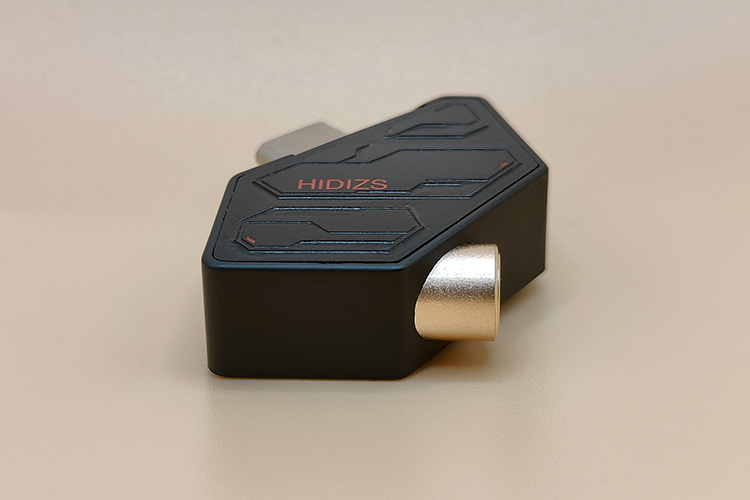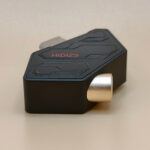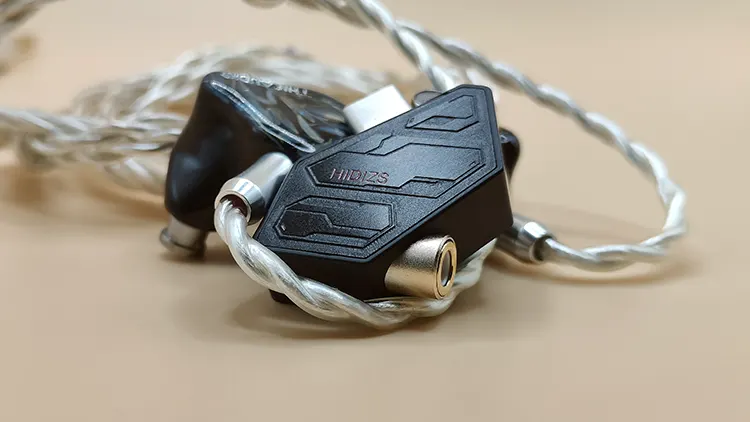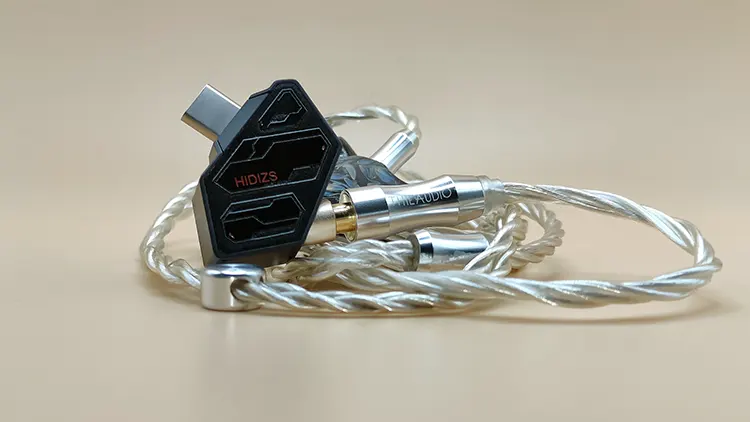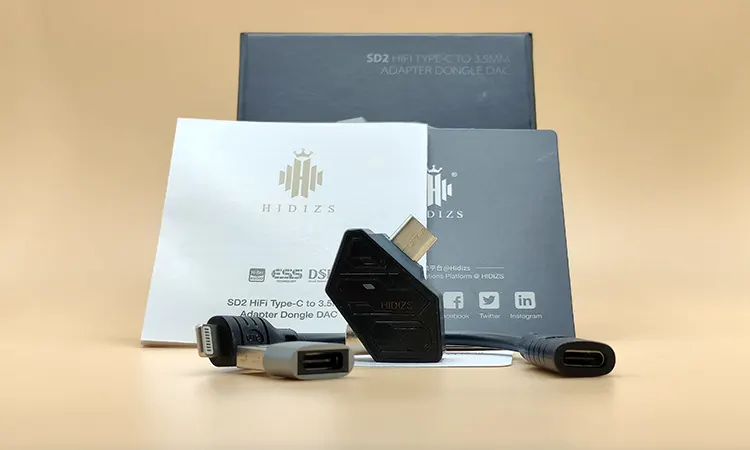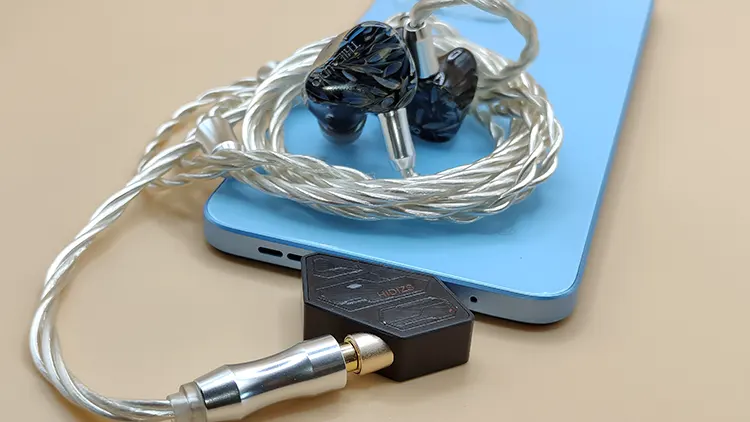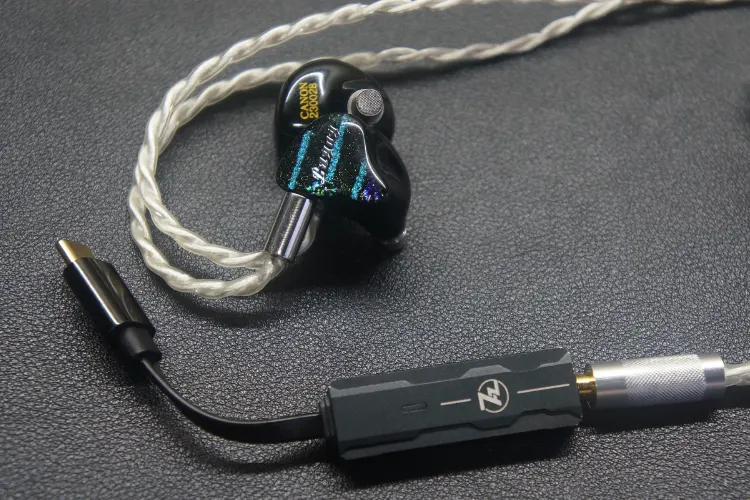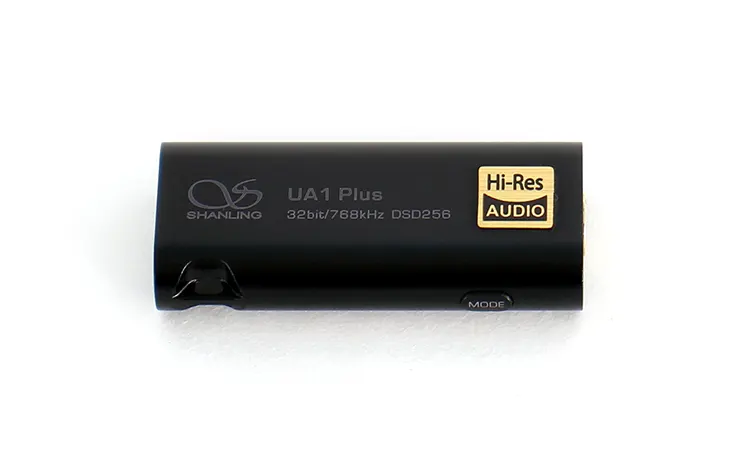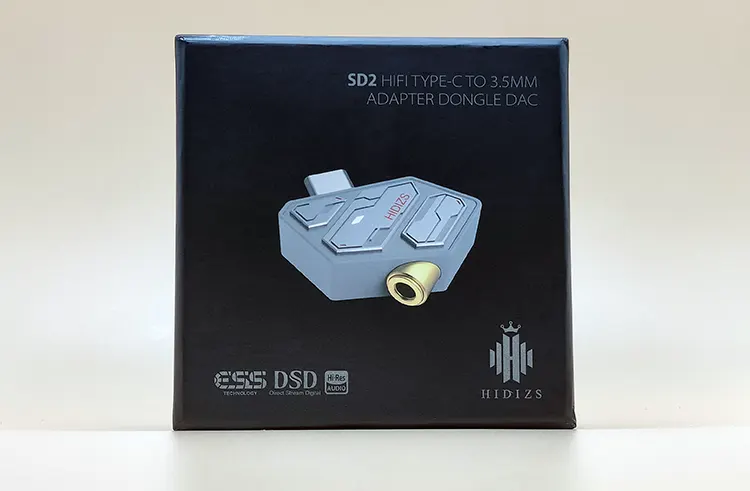Today, Kurt reviews the Hidizs SD2, which is an affordable Apple & Android-compatible dongle DAC with up to PCM 384kHz and DSD128 decoding. It is currently priced at 39.99 with an SRP of $49.99.
Disclaimer: This sample was sent to me in exchange for our honest opinion. Headfonics is an independent website with no affiliate links or status. I thank Hidizs for their support.
To read more about Hidizs products we have previously assessed on Headfonics click here.
Please note, that this article follows our current scoring guidelines which you can read in more detail here.
The Hidizs SD2 strays away from the normal dongle DAC format with a no-cable-needed design at an angle. It has a very compact design that focuses on ease of usage and portability.
Hidizs also explains the Hidizs SD2 as a versatile and multi-purpose dongle DAC with a very affordable $39.99 price point. That is their most affordable dongle to date with the S9 Pro at $59.99 and the S3 Pro at $69.99 SRP.
So how does it fare in my testing and conclusion? Read my full review below to find out in more detail.
Tech Highlights
The Hidizs SD2 uses an ESS ES9270 DAC, which is a slightly older chipset but still a capable one. It supports full 32bit/384kHz PC decoding and DSD128 as well.
Its total output power is 70mW + 70mW @32-ohms which should be enough for most IEMs. Testing with my IEMs and a smartphone I didn’t need much more than about 40% volume.
Unlike other dongle DACs, the Hidizs SD2 is also capable of in-line microphone support. People who use IEMs as their primary microphonics device will have no issues with it.
Using the Hidizs SD2 with a microphone converts the audio streams to 24bit/48kHz. This ensures you get clear calls even if music is playing or receive clear audio whenever you’re playing games with voice chat.
Design
The Hidizs SD2 has a unique mecha-style boxy design. There’s a lot of boxes and lines engraved on it to give it that futuristic cyberpunk vibe as well. It’s compact, small, and would fit in even those tiny jeans pockets. It’s lightweight as well, so connecting it to a phone adds no heaviness to it.
The design is symmetrical on either side with the Hidizs name printed on it. There is a slight difference though, one side has an LED indicator. The LED indicator blinks red if the audio is 44.1kHz to 48kHz. Otherwise, it blinks blue if it’s 88.2kHz to 384kHz or DSD128.
Features
The Hidizs SD2 supports a 3.5mm headphone jack only. There is no balanced 4.4mm or 2.5mm support here.
It’s understandable since it measures in at 34.5mm x 20mm x 10mm or 1.36 inches x 0.79 inches x 0.40 inches only. Adding a 4.4mm or 2.5mm balanced output would beat its purpose as a small, lightweight, and compact dongle DAC for all cases.
The SD2 has no direct or onboard volume control. It’s a simple and efficient plug-and-play dongle DAC. The volume gets loud enough in any device I’ve tested. For EQ, all EQ applications work with it like Wavelet, PowerAmp, PeaceEQ, and more.
Wired Connectivity
Using it on Windows 11, it’s simply plug-and-play. There is no need to download drivers elsewhere to make it work. Previous versions of Windows work the same as well. My testing of the SD2 on Linux, MacOS, and Ubuntu also has a similar experience.
The sound quality is the same in Windows and Linux distros such as Ubuntu. Switching to MacOS offers higher bitrates.
Having used it via OTG on my regular commutes, it’s sincerely the best dongle DAC I’ve used regarding thermals. I prefer this since my phone is already considerably hot with 5G turned on, so having a cooler dongle DAC is preferable.
Using it with Apple Music lights up the LED to blue, which means it’s around 88.3kHz to 384kHz in quality. That’s accurate since I have ALAC Lossless in my downloaded music.
Packaging & Accessories
Hidizs didn’t cheap out on the accessories of the Hidizs SD2. Firstly, we get a lightning male to USB type C female cable for all iOS devices that still use the lightning port. I’ve tried this on an iPhone X as well as an iPhone 14 and there weren’t any compatibility issues.
Secondly, there’s also a USB-A male to USB-type C female dongle. PC users without a USB type C in their motherboard can also use this. Laptop users can simply plug it in and use it.
Lastly, you get the manual, warranty card, and QC card. If there’s ever an issue with your Hidizs SD2, you can use the warranty card to ask for a replacement.
Sound Impressions
Summary
The Hidizs SD2 is neutral in most aspects. There wasn’t much coloration done, but there were some aspects modified.
The bass wasn’t lowered or increased. But I did hear that there’s a bit more texture and low-end presence using the Hidizs SD2.
The mids are the ones that get modified. I hear the vocals as a lot further forward and brighter sounding. This might be an issue for those who are sensitive to bright mids. I know there are dark-tuning fans as well, so they should consider this coloration.
The treble remains the same in detail retrieval. It does sound more vibrant and sparklier than normal. It still retains its neutral sound but is livelier. This means if your IEM has sibilance issues, then it’ll still have that sibilance problem.
Overall, the Hidizs SD2 having a neutral yet fun midrange is great for its identity of being a compact, lightweight, and purposeful dongle DAC. That less than 10g of weight is impressive for a dongle.
Timbre
The Hidizs SD2 doesn’t affect the timbre much. Its promise to neutrality is being kept here as well. Those IEMs with questionable timbre can’t be salvaged with the Hidizs SD2.
Staying true to the IEM timbre is better than adding any sharpening or mud in my opinion. Instead, the Hidizs SD2 adds to the experience by giving more nuanced refinements.
For example, the timbre in the instruments gets some additional dynamic lift. I can hear that strings have more potency to it, especially electric guitars.
Overall, the Hidizs SD2’s timbre is something most people will enjoy. Natural, clean, and no obvious coloration timbre is the ideal output in dongle DACs for most users.
Staging & Dynamics
I enjoyed this aspect of the Hidizs SD2 a lot. The staging and imaging are wonderfully amplified in all the IEMs I use.
The staging is a level wider and taller than normal with improved dynamics. Using it with my IEMs gives me a better out-of-head experience. The imaging has pinpoint accuracy this time.
Synergy
I’ve tried the Hidizs SD2 with numerous IEMs. I’ve used it with the Thieaudio Hype 2, Truthear Nova, Raptgo Bridge, and FiiO JD7 to name a few.
The Hidizs SD2 helped in elevating the soundstage of the Thieaudio Hype 2. This was the issue I had with the Thieaudio Hype 2 and seeing the Hidizs SD2 make the soundstage better, it’s something to appreciate.
Additionally, it made the vocals of the Thieaudio Hype 2 more forward and clear. I was able to hear those micro details and texture in the vocals much better.
As someone who enjoys forward vocals, having the Hidizs SD2 do that for me fits my preference. It does the same thing for my darker-tuned IEMs too.
Select Comparisons
7hz Sevenhertz 71
Technical
The 7hz SEVENHERTZ 71 uses the AKM AK4377 chip, which was normally used in flagship DAPs way before this was released. This chip is known for its small space requirement and lower distortion rate with wider staging.
The cable is non-detachable here, so if it ever has issues then you’d need to solder it or buy a new one. On another note, it is compatible with all Android versions and the lightning port with a proper connector.
It’s also able to output 32bit/384kHz and DSD128. All lossless, FLAC, and lossy audio files will have no problem running using it.
Design
The 7hz SEVENHERTZ 71 uses aluminum for its shell that’s developed using CNC machining. It has that all-black look that most dongle DACs use.
It has the 7hz branding printed on top of it next to its LED indicator. Its overall look also has a cyberpunk mecha design. It only has 3.5mm unbalanced, which means people who use balanced headphone jacks should look elsewhere.
Performance
The Hidizs SD2 and 7hz SEVENHERTZ 71 focus on different things but are similar in what they want to achieve.
For the differences, the Hidizs SD2 focuses on creating a more forward midrange. The vocals are brighter and livelier, which is the only coloration it does. On the other hand, the 7hz SEVENHERTZ 71 focuses on the bass more. It enhances the sub-bass to give that potent and textured enhanced bass experience.
They are both similar in that they do not add much coloration aside from increasing the vocal bloom.
Shanling UA1 Plus
$49.99
Technical
The Shanling UA1 Plus uses the CS43131 chip made by Cirrus Logic. This is a powerful chip since it’s designed to even power higher-end headphones with strong resistances or ohm ratings.
It’s able to output 32bit/768kHz and DSD256. All forms of audio will be able to run here with ease.
Design
The design of the Shanling UA1 Plus is more traditional with its rectangular shape and detachable cable that most dongle DACs aim for. Of the two, the Hidizs SD2 has a smaller form factor with its cableless and rhombus-like shape.
The Shanling UA1 Plus has that black unibody design like most dongle DACs. It has the Hi-Res Audio, Shanling, and bitrate brandings on top as well.
There’s a little ridge below it where you can put a keychain holder. If you’re someone who doesn’t use travel pouches, then you can use that keychain holder spot to put the Shanling UA1 Plus on your bag.
The Hidizs SD2 has no button to control the volume, but the Shanling UA1 Plus has it. Along with that, the Shanling app also supports channel balancing and manual volume changing for it.
Performance
On the audio side, the Hidizs SD2 supports proper microphones while the Shanling UA1 Plus doesn’t accept them. If you’re someone who uses a cable with a mic, the Hidizs SD2 is a better choice for this.
Tonally, the Shanling UA1 Plus doesn’t add any form of coloration at all, while the Hidizs SD2 creates a more mid-forward presentation.
Both of these dongles have zero hissing with a black background. The Shanling UA1 Pro has issues with skipping parts in music though, but the Hidizs SD2 doesn’t have that issue.
The only annoying thing I can find with the Hidizs SD2 is that there’s a loud pop when plugging it into my phone or laptop. For the Shanling UA1 Plus, it gets hotter than the Hidizs SD2.
Our Verdict
Despite its unique shape and look, the Hidizs SD2 dongle DAC brings excellent portability, thermal management, and compatibility across all platforms. It supports mic-in and audio-out which stays true to its claim of a true one-fits-all dongle DAC.
It has a competitive decoding capability of up to 32bit/328kHz and DSD128 and reasonable power primarily for IEM use.
This is an affordable, compact, lightweight, and versatile dongle DAC for all your devices without skimping out on power and sound quality, the Hidizs SD2 has got your back.
Hidizs SD2 Technical Specifications
- Dimensions: 34.5 x 20 x 10mm
- Weight: 6 grams
- Decoding Formats: PCM 32bit/384kHz, DSD64/128
- Headphone Jack: 3.5mm Unbalanced
- Output Level: 70mW + 70mW SE 3.5mm
- Maximum Output Power: 70mW + 70mW@32-ohms

